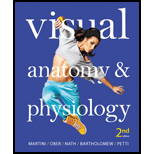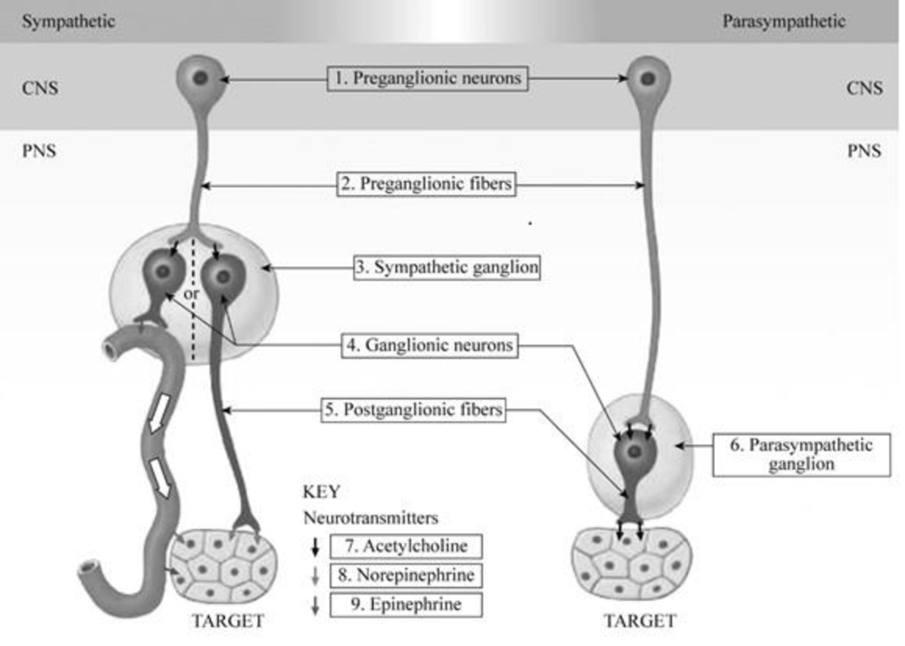
To label: The anatomical characteristics of ANS.
Introduction: The autonomic nervous system (ANS) is a functional division of the peripheral nervous system. It is structurally and functionally divided into two parts, namely the sympathetic nervous system (SNS) and the parasympathetic nervous system (PSNS).
Answer to Problem 1CRQ
Pictorial representation: Fig.1 represents the anatomical characteristics of ANS.

Fig.1: The anatomical characteristics of ANS
Explanation of Solution
The sympathetic nervous system consists of many nerve cells that are found in the peripheral nervous system and central nervous system. In this division, axons of the preganglionic neurons are shorter than the postganglionic fibers. Key neurotransmitters of sympathetic division are acetylcholine, norepinephrine, and epinephrine. In PSNS, the preganglionic fiber synapses over 6 to 8 ganglionic neurons. These neurons may be present in the intramural ganglia. An intramural ganglion refers to a group of neurons that are embedded in the wall of the tissue of target organ. The key neurotransmitter of parasympathetic division is acetylcholine.
Want to see more full solutions like this?
Chapter 14 Solutions
Martini: Modi Mast Pear Etex V Ssp_2 (2nd Edition)
 Human Anatomy & Physiology (11th Edition)BiologyISBN:9780134580999Author:Elaine N. Marieb, Katja N. HoehnPublisher:PEARSON
Human Anatomy & Physiology (11th Edition)BiologyISBN:9780134580999Author:Elaine N. Marieb, Katja N. HoehnPublisher:PEARSON Biology 2eBiologyISBN:9781947172517Author:Matthew Douglas, Jung Choi, Mary Ann ClarkPublisher:OpenStax
Biology 2eBiologyISBN:9781947172517Author:Matthew Douglas, Jung Choi, Mary Ann ClarkPublisher:OpenStax Anatomy & PhysiologyBiologyISBN:9781259398629Author:McKinley, Michael P., O'loughlin, Valerie Dean, Bidle, Theresa StouterPublisher:Mcgraw Hill Education,
Anatomy & PhysiologyBiologyISBN:9781259398629Author:McKinley, Michael P., O'loughlin, Valerie Dean, Bidle, Theresa StouterPublisher:Mcgraw Hill Education, Molecular Biology of the Cell (Sixth Edition)BiologyISBN:9780815344322Author:Bruce Alberts, Alexander D. Johnson, Julian Lewis, David Morgan, Martin Raff, Keith Roberts, Peter WalterPublisher:W. W. Norton & Company
Molecular Biology of the Cell (Sixth Edition)BiologyISBN:9780815344322Author:Bruce Alberts, Alexander D. Johnson, Julian Lewis, David Morgan, Martin Raff, Keith Roberts, Peter WalterPublisher:W. W. Norton & Company Laboratory Manual For Human Anatomy & PhysiologyBiologyISBN:9781260159363Author:Martin, Terry R., Prentice-craver, CynthiaPublisher:McGraw-Hill Publishing Co.
Laboratory Manual For Human Anatomy & PhysiologyBiologyISBN:9781260159363Author:Martin, Terry R., Prentice-craver, CynthiaPublisher:McGraw-Hill Publishing Co. Inquiry Into Life (16th Edition)BiologyISBN:9781260231700Author:Sylvia S. Mader, Michael WindelspechtPublisher:McGraw Hill Education
Inquiry Into Life (16th Edition)BiologyISBN:9781260231700Author:Sylvia S. Mader, Michael WindelspechtPublisher:McGraw Hill Education





